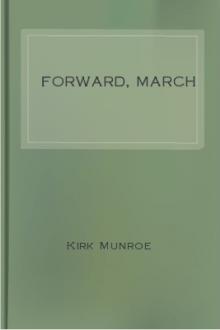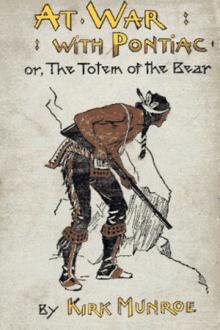Forward, March, Kirk Munroe [some good books to read .txt] 📗

- Author: Kirk Munroe
- Performer: -
Book online «Forward, March, Kirk Munroe [some good books to read .txt] 📗». Author Kirk Munroe
"If we only had our horses we could catch every one of those chaps," said Rollo Van Kyp, as he sat in a window of the ruined building just captured by the Riders, happily swinging his legs and fanning himself with his hat. The young millionaire's face was black with powder, covered with blood from the scratching of thorns, and streaked with trickling perspiration. His shirt and trousers were in rags.
"It's a beastly shame we weren't allowed to bring them," he continued, "for this fighting on foot in the tropics is disgustingly hot work. Now if I were in Teddy's place--"
"Private Van Kyp," interrupted Sergeant Norris, sternly, "instead of criticising your superiors you had better go and wash your face, for your personal appearance is a disgrace to the troop. But oh, Rollo!" he added, unable longer to maintain the assumed dignity under which he had tried to hide his exultation, "wasn't it a bully fight? and aren't you glad we're here? and don't you wish the home folks could see us at this very minute?"
The fight of Las Guasimas, in which Rough Riders and colored regulars covered themselves with glory, was only a first brisk skirmish between the advanced outposts of opposing armies, but its influence on both sides was equal to that of a pitched battle. It furnished a notable example of the steadiness and bull-dog tenacity of the American regular, as well as the absolute fearlessness and determination to win, at any cost, of the dudes and cowboys banded under the name of Rough Riders. It afforded striking proof that it is not the guns, but the men behind them, who win battles, since an inferior force, unsupported by artillery, and unprovided with bayonets, had charged and driven from strong intrenchments nearly four times their own number of an enemy armed with vastly superior weapons. It inspired the Americans with confidence in themselves and their leaders, while it weakened that of the Spaniards in both. To the Rough Riders it was a glorious and splendidly won victory, and as they swarmed over the intrenchments, from which the fire of death had been so fiercely hurled at them that morning, they yelled themselves hoarse with jubilant cheers.
Then came the reaction. They were exhausted with the strain of excitement and their tremendous exertions under the pitiless tropical sun. Strong men who had fought with tireless energy all at once found themselves trembling with weakness, and the entire command welcomed the order to make camp on the grassy banks of a clear stream shaded by great trees.
In their baptism of fire eight of the Riders had been killed outright, thirty-four more were seriously wounded, and fully half of the remainder could show the scars of grazing bullets or tiny clean-cut holes through their clothing, telling of escapes from death by the fraction of an inch. Ridge Norris, for instance, found a livid welt across his chest, looking as though traced by a live coal, and marking the course of a bullet that, with a hair's deflection, would have ended his life, while Rollo Van Kyp's hat seemed to have been an especial target for Spanish rifles.
After regaining their breath, and receiving assurance that the enemy had retreated beyond their present reach, these two, in company with many others, went back over the battle-field to look up the wounded, and bring forward the packs flung aside at the beginning of the fight.
At sunset that evening the Riders buried their dead, in a long single grave lined with palm-leaves, on a breezy hill-side overlooking the scene of their victory. The laying to rest of these comrades, who only a few hours before, had been so full of life with all its hopes and ambitions, was the most impressive ceremony in which any of the survivors had ever engaged. It strengthened their loyalty and devotion to each other and to their cause as nothing else could have done, and as the entire command gathered close about the open grave to sing "Nearer my God to Thee," many a voice was choked with feelings too solemn for expression, and many a sun-tanned cheek was wet with tears. The camp of the Rough Riders was very quiet that night, and the events of the day just closed were discussed in low tones, as though in fear of awakening the sleepers on the near-by hill-side.
After the fight of Las Guasimas, its heroes rested and waited for six days, while the remainder of the army effected its landing and made its slow way to the position they had won over the narrow trails they had cleared. These days of waiting were also days of vast discomfort, and the patient endurance of drenching tropical rains and steaming heat, the wearing of the same battle-soiled clothing day after day and night after night, and, above all, of an ever-present hunger, that sapped both strength and spirits. They had started out with but three days' rations, and four days passed before a scanty supply of hard-tack, bacon, and coffee began to dribble into camp. The road to Siboney, flooded by constant rains, bowlder-strewn, and inches deep in mud, was for a long time impassable to wagons; and during those six days such supplies of food and ammunition as reached the idle army were brought to it by three trains of pack-mules that toiled ceaselessly back and forth between the coast and the front, bringing the barest necessities of life, but nothing more.
So the American army suffered and prayed to be led forward, while the Spaniards between them and Santiago strengthened their own position with every hour, and confidently awaited their coming. The invaders now occupied the Sevilla plateau, and were within five miles of the city they sought to capture. In their front lay a broad wooded valley, to them an unknown region, and on its farther side rose a range of hills, that Ridge Norris told them were the San Juan Heights, strongly protected by block-houses, rifle-pits, and bewildering entanglements of barbed wire, a feature of modern warfare now appearing for the first time in history. With their glasses, from the commanding eminence of El Poso Hill, crowned with the ruined buildings of an abandoned plantation, the American officers could distinctly see the Spaniards at work on their intrenchments a mile and a half away, and note the ever-lengthening lines of freshly excavated earth.
But for six days the army waited, and its artillery, which was expected to seriously impair, if not utterly destroy the effectiveness of those ever-growing earthworks, still reposed peacefully on board the ships that had brought it to Cuba. Only two light batteries had been landed, and on the sixth day after Las Guasimas these reached the front. At the same time came word that General Pando with 5000 Spanish reinforcements was nearing the besieged city from the north. In that direction, and only three miles from Santiago, lay the fortified village of Caney, held by a strong force of Spanish troops. If it were captured, Pando's advance might be cut off. So General Shafter, coming ashore for the first time a week after the landing of his troops, planned a forward movement with this object in view. Lawton's division was to capture Caney, and then swing round so as to sever all outside communication with Santiago. While he was doing this, demonstrations that should deter the Spaniards from sending an additional force in that direction were to be made against San Juan and Aguadores. These movements were to occupy one day, and on the next the reunited army was to attack the entire line of the San Juan ridge. In the mean time no one knew anything of the valley lying between this strongly protected ridge and those who proposed to capture it.
So the order was issued, and late in the afternoon of June 30th, in a pouring rain, the camps were broken, and the drenched army eagerly began its forward movement. Lawton's division marching off to the right slipped and stumbled through the mud along a narrow, almost impassable, trail over the densely wooded hills until eight o'clock that evening, when, within a mile of Caney, it lay down for the night in the wet grass without tents or fire, and amid a silence strictly enjoined, for fear lest the Spaniards should discover its presence, and run away before morning.
At the same time Wheeler's division of dismounted cavalry, including the Rough Riders and Kent's infantry division, advanced as best it could over the horrible Santiago road, ankle-deep in mud and water, to El Poso Hill, on and about which it passed a wretchedly uncomfortable night. Seven thousand heavily equipped men, mingled with horses, artillery, pack-mules, and army wagons, all huddled into a narrow gully slippery with mud, advance so slowly, however eager they may be to push forward, that although the movement was begun at four o'clock, midnight found the rearmost regiment still plodding wearily forward.
With the coming of daylight, on July 1st, the army lay beneath a dense blanket of mist that spread its wet folds over the entire region they were to traverse. It was eight o'clock before Grimes's battery of four light field-pieces, posted on El Poso Hill, opened an ineffective fire upon the heights across the broad valley. For twenty minutes the Spaniards paid no attention to the harmless barking of the little guns; then the smoke cloud hanging over them proved so admirable and attractive a target that they could no longer resist firing at it. So shells began to fall about the battery with such startling accuracy that a score of Americans and Cubans gathered near it were killed or wounded before they could seek shelter. Among these first victims of the San Juan fight were several of the Rough Riders.
About this time General Sumner, temporarily in command of the cavalry, was ordered to advance his troops into the valley as far as the edge of the wooded belt, and within half a mile of the San Juan batteries.
"What shall I do when I get there?" asked General Sumner.
"Await further orders," was the curt reply.
There were other changes in commands that morning; for Brigadier-General Young, being prostrated by a fever, the Colonel of the Rough Riders was assigned to his duties, and became "General" Wood from that hour. At the same time his Lieutenant-Colonel stepped into the vacancy thus created, and as "Colonel" Roosevelt was destined to win for himself and his dashing command immortal fame before the setting of that day's sun.
So the Rough Riders, together with five other regiments of dismounted cavalry, started down the deep-cut road, which in places was not over ten feet wide, and was everywhere sticky with mud, while an entire infantry division was crowded into it behind them. Like all other roads in that country, this one, now densely packed with human beings advancing at a snail's pace along nearly three miles of its length, was bordered on both sides by an impenetrable tropical jungle.
The Spaniards were advised of the forward movement, and though they could not see it, were already directing a hot fire at this road, of whose location they were, of course, well aware, and from the outset dead and wounded men marked the line of American progress. After a mile of marching under these conditions, the foremost troops came to a place where the San Juan River crossed the road. A short distance beyond it crossed again, thus forming the ox-bow to be known ever after that memorable day as the "Bloody Bend." A little farther on was open country, and here





Comments (0)